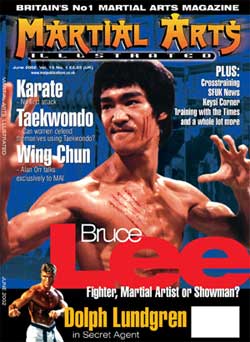
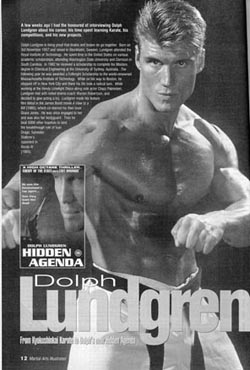
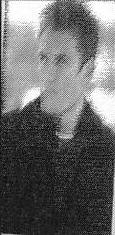
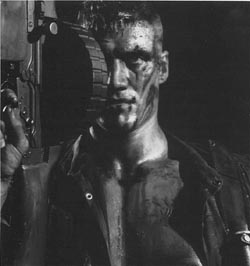
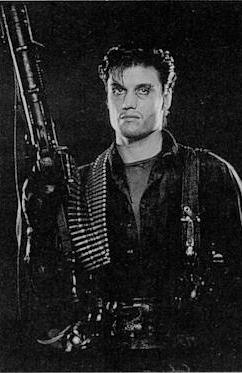
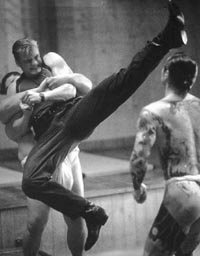
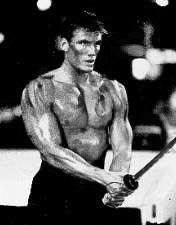
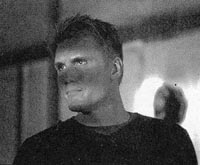
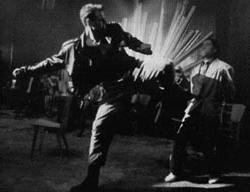
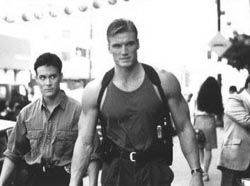
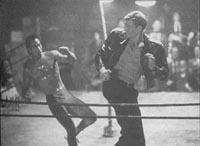
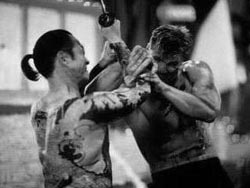
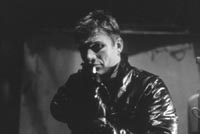
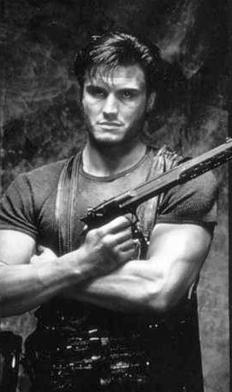
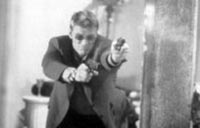
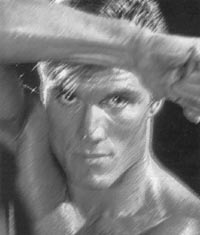
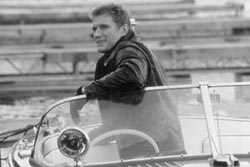
|
Dolph Lundgren
From Kyokushinkai
Karate to Dolph's new Hidden Agenda
by Andrew Staton,
Martial
Arts Illustrated (UK), Vol 15 No 1, June 2002
A few weeks ago I had the
honor or interviewing Dolph Lundgren about his career, his time
spent learning Karate, his competitions, and his new projects.
Dolph Lundgren is living proof
that brains and brawn do go together. Born on 3rd November 1957
and raised in Stockholm, Sweden, Lundgren attended the Royal
Institute of Technology. He spent time in the United States on
various academic scholarships, attending Washington State University
and Clemson in South Carolina. In 1982 he received a scholarship
to complete his Masters degree in Chemical Engineering at the
University of Sydney, Australia. The following year he was awarded
a Fulbright Scholarship to the world-renowned Massachuesetts
Institute of Technology. While on his way to Boston, he stopped
off in New York City and there his life took a radical turn.
While working at the trendy Limelight Disco alongside actor Chazz
Palminteri, Lundgren met with noted drama coach Warren Robertson,
and decided to give acting a try. Lundgren made his feature film
debut in the James Bond movie A View to a Kill (1985),
which co-starred his then lover Grace Jones. He was once engaged
to her and was also her bodyguard. Then he beat 5000 other hopefuls
to land the breakthrough role of Ivan Drago, Sylvester Stallones's
opponent in Rocky IV (1985).
The success of this film led
Lundgren to star in numerous films, including Masters of the
Universe (1987). The Punisher (1989), Showdown
in Little Tokyo (1991) opposite the late Brandon Lee, Universal
Soldier (1992) and Johnny Mmemonic (1995). In 1993
he starred in Pentathlon (1994), an action-drama which
he also produced under his own production company, Thor Pictures
(also known as Red Orm Productions). While most of his films
tend to typecast him as a bidcep-bulging hero, Lundgren is also
a founding member of 'Group of Eight', a New York theatre group
started in 1994 which performed "Another Octupus."
A world-class athlete, Lundgren took up martial arts at fourteen
and has achieved his 3rd degree black belt in Kyokushinkai Karate.
His accomplishments in the sport include being the captain of
the Swedish Full-Contact karate team and the winner of the European
Heavyweight Full-Contact Karate Championship in 1980 and 1981,
as well as the Australian heavyweight division title in 1982.
Lundgren's lifelong interest in physical fitness led to his 1987
workout video called Maximum Potential. in addition to
his Karate expertise, he was selected to serve as team leader
of the the 1996 U.S. Olympic Pentathlon Team. He is married to
Annette Qviberg Lundgren, a jewellery designer and fashion stylist.
The couple divide their time between London and Marabella, Spain,
and their daughter Ida was born in April, 1996. He speaks five
languages, Swedish, English, German, French and Japanese.
Andrew Staton: Dolph, when
did you first decide to learn martial arts?
Dolph Lundgren: I guess I was about fourteen and I was living
in the northern part of Sweden with my grandparents because there
was a bit of a problem in school. I wasn't studying, I was running
around with the wrong company, so I was sent up there to a small
village. There was a Karate instructor in a slightly bigger town
and I started with him. I did Judo at the same time and Gojo
Ryu Karate, it was something I took to instantly. Then I moved
to Stockholm a couple of years later when I was about sixteen
and that was when I started to do Kyokushinkai Karate with a
British sensei named Brian Fitkin.
What do you like about this
style of Karate?
Well, I have done Judo and other styles through friends and contact
with people in the movies. These are Kendo, Aikido, Jujitsu and
self defense, but what I liked about Karate was that it was really
tough, it was a bit of a challenge and a bit scary. There was
body contact and I suppose I was trying to get more self confidence
because I was quite insecure as a youngster.
How did you feel when you
went into you first Karate competition?
I felt terrible. I was extremely nervous having built up incredible
pressure on myself I always put myself under pressure, because
physically I felt insecure and incapable of coming up to my own
standards. When I was younger I had a few allergies and asthma,
which limited my sports until I was about fourteen, I felt pretty
bad and I really wanted to do well, and of course when you get
nervous you tense up and you can't react quick enough. My strength
was that I kept coming back and I never gave up.
Were you always very tall?
Not always. I don't think I started growing tall until I was
fifteen, and until then I was average, even below average height.
I remember in summer I was usually quite ill, I couldn't see
through my eyes due to hay fever and I had to take medication
so I was quite sick, but as I started growing up I lost these
allergies.
You started learning martial
arts before the Kung Fu craze of the early seventies, did that
effect you when it came along?
I had started Karate only a few years before the Bruce Lee craze
started, but Sweden is quite isolated, we did know of Bruce Lee,
but his movies did not appear in my country until later. The
Kung Fu craze did hit Sweden but it wasn't until the late seventies.
Before that, you didn't need a lot of expensive equipment, there
weren't any aerobic classes, not even body building existed,
so the sports you could do were football, hockey or martial arts.
How did you feel when you
got your first black belt?
My fist Dan? Oh boy, it felt great. I got that on in 1981, and
of course by then I had been training pretty hard for about six
years and you know I had competed. I competed in top European
tournaments and point fighting, then I started with knock down
in contact fighting and won some tournaments and really came
into my own. I was a Karateka, therefore my first Dan was a great
experience because I had been a shy kid and I had felt really
embarrassed about my body, so to get a black belt in Karate made
me feel proud of myself.
Do you feel that if you went
into a Karate competition now opponents would feel daunted by
your size and power?
I don't compete now, but if I spar sometimes yeah, I recognise
that. When I took my third dan a couple of years ago, obviously
I did some sparring with twenty-five students and when I got
my fist black belt some of them hadn't even started training.
Of course they were a little intimidated, but at this point I
don't have anything to prove, I don't feel I have to beat somebody
up, so in general I think it's a good experience for me and for
them.
If somebody asked you to describe
why it was a good idea to learn martial arts or Karate, what
would you say?
I think it teaches you to understand yourself better, because
you are putting yourself under stress and you have to prove yourself.
I think you are able to understand your character and it gives
you a stronger character and a commitment to yourself. You learn
to respect other people, to understand your own weaknesses, so
I think the most important reason to learn Karate or a martial
art would be on a character level. Most people who are real martial
artists are quite pleasant and decent people to know.
Did you ever consider male
modeling, because you got your first break in the James Bond
movie A View to a Kill?
Yes, I did do some male modelling when I came to New York. I
was on my way to Boston to study at M.I.T. which is an engineering
school. I met a singer called Grace Jones who was a high profile
character at that time, I had met her in Australia when I was
studying there. I came to New York and did some modelling because
I was trying to get my green card so that I could work in America,
and make a few bucks on the side. The View to a Kill thing
was simply, because I was on the set, and Grace was in the movie
and they just wanted someone to point a gun at Christopher Walken.
It wasn't really a break that would launch my career, that came
with Rocky 4.
What was it like working with
Stallone?
It was very exciting. I was in Sydney in 1982 fighting in the
Australian open, studying engineering and I went to the movies
and saw a film called Rocky 3. I thought it was great
and the music was uplifting, little did I know that I was to
appear in the next one. I had no thought of becoming an actor
and of course when you get to act with Sylvester Stallone, you
fight, spar and train together, becoming friends I would say.
It was a good experience for a young kid from Sweden.
As soon as you finished Rocky
4, you were offered another movie which was as He-man in
Masters of the Universe. What did you think about this
movie?
That movie was a big responsibility for me in one way because
in the last picture I'd played a co-star, opposite a big star,
Stallone. I was just the heavy so I didn't have a lot of pressure
to appear outside the picture for publicity, but with Masters
of the Universe, it was an important image for Mattel, the
toy company, so He-man was a lot of additional pressure at that
point when I had just got used to being a movie star, instead
of a guy who pounded the bag every day. It was an adventure but
that was the beginning of searching to find myself again, after
becoming a name so to speak.
After this you did several
high action movies like Red Scorpion and Punisher,
but then you moved back into a martial arts movie called Showdown
in Little Tokyo. Can you tell me how that happened?
After that was a Warner Brothers picture and I think they were
basically trying to team up two action guys from independent
action worlds. It was me and this young kid Brandon Lee, who
had a famous father. It was definitely a martial arts driven
picture, which I hadn't done before.
Did you have any previous
knowledge of Brandon?
Not really, no. I got to know him on the set, working with him,
and I quickly realized he wanted to become a star. The kid had
an incredible screen presence, he had ambition and much more
acting training. I just went with the flow, and I fell into the
movies. I never wanted to be an actor, but he had always wanted
to be an actor, even when he was a kid and he watched his dad.
He had a whole different level of commitment, so I knew he was
going to make it.
So what did you feel about
the martial arts used in the movie?
Well, thinking back I wish it had been a little more Kyokushinkai
driven. My instructor Brian Fitkin was there training me and
helping out with some of the fight scenes. I thought it was ok
and it had some good stuff, but not compared to The Punisher.
In The Punisher we had some real fighters from Hombu,
Tokyo and they were Kyokushinkai competitors, who were really
good fighters. I think some of the fight scenes have a more authentic
feel to them than Showdown. I thought that it was ok and
Brandon did well, he was very acrobatic and he really committed
himself. I got to do a lot of work with a sword, a katana with
a Japanese sword instructor which was a lot of fun. I think it
was a way for me to get back into martial arts because I had
let martial arts go after Rocky, I didn't practice any more.
You starred in Univeral
Soldier with Jean Claude Van Damme, did you enjoy this movie?
It was fun, it was a great part. I was playing a heavy for the
second time, and it's a kind of freedom to play the bad guy you
have much more fun, you don't feel you have to be Mr. Nice Guy
all the time, you don't feel so constrained. I aso had a good
time as an actor. we worked out together and I got to know him.
He was a young up and coming star, so it was fun to pull weight.
It was interesting to work with Roland Emmerich who did Independence
Day, he was a really good director.
You got to work with John
Woo in Blackjack, how did that come about?
We had the same agent at that time and John Woo wanted to get
into television and tried to find a project which we could work
on together. Something that would expose his special talents,
action and storytelling, and he wanted to use my action background
somehow. It went through a lot of re-writes and drafts and finally
the movie was a very extravagant shoot for a pilot TV show, it
was a ten week shoot so we put a lot of time into it.
Did you enjoy the John Woo
style action?
I felt there was more of an opportunity for me there. Even though
the pilot didn't go to a series, I felt inspired to work harder,
because I knew that Woo was a very good director, and he could
make things look good, but sometimes you do a great stunt and
it ends up being cut, and is never seen.
How did you get involved in
the Hidden Agenda project?
I was approached by the production company. The director was
a Montreal filmmaker who had written the script, it was more
of a thriller than an action film. I had worked in Montreal before
and I like the city and the actors were quite good, they had
their own film industry up there, so I thought it would be an
interesting project for me.
Do you think you pulled off
a good piece of work?
For what it was, yes. I think, looking back it was a little dialogue
heavy. One reason I became a movie star was because the camera
likes me and that's why you don't have to do so much sometimes.
The less you do the better.
Which movies would you say
are your best and why?
Well, I think my best work to date is Rocky 4. It's a
nostalgic picture for me, I was young and at my peak physically.
It reminds me of my career as a fighter and martial artist and
also it's a typical example of an action speaks louder than words
character. Another film I like that you haven't probably seen
is Men of War which was shot in Thailand. It has a good
script by John Sayles who is an academy award winning writer,
director. It had a good cast and a wonderful location in the
province of Krabi on P.P Island where they filmed The Beach
with Leonardo DiCaprio a few years ago. This was before it was
developed, it was built a bit like Seven Samurai and that's
a great picture to watch.
What are you planning to do
with the rest of your career, will you carry on with movies or
use your chemical engineering degree?
Well (laughing), I won't be going back into chemical engineering
just yet, but I did go back to my old college in Sweden and met
some of the old professors, they were all shocked to see me there.
I'm now living in Europe trying to spend a little more time with
my family, so I'm doing a bit of work down here in Marabella,
a bit of real estate. My wife's opening some shops there, and
we are bringing some stuff in from Asia, clothing and jewellery.
I'm trying to diversify, but I do still like the movies and at
the moment I'm looking at three projects which will all shoot
this year, so I'll probably end up doing two of them, they're
all action movies. One's an interesting script, the other's interesting
because it's to be filmed in India where I have never been. But
I haven't signed yet. I can't say anything at the moment, it's
an exotic movie, a bit like Men of War, the big blond
guy in the jungle kind of thing.
Can you tell me a little more
how you obtained your third dan in Kyokushinkai Karate?
I got my third dan in 1998, and it was a lot of fun. I had to
train hard for it, they didn't just ask me because I was famous,
so I went through the training with my old friends and I stayed
in Sweden four to five months and finally did the grading in
July. It is like the highest technical degree in Kyokushinkai
you have to know the twenty-five katas and you have to do twenty
fights. It takes three or four hours, but it was a good experience,
and my instructor Brian Fitkin said that I should get somebody
to film it, which I did, because ten years from now you are not
going to believe you did it, and I already feel he was right.
Dolph Lundgren, thank you
very much from all of us at Martial Arts Illustrated.
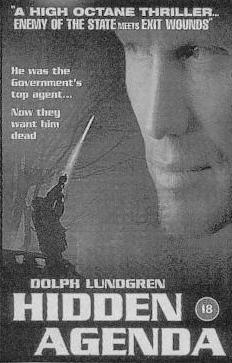 Hidden Agenda
Hidden Agenda
When Dolph Lundgren got his big
break in Rocky 4 he really struck gold at the beggining
of his career, and when you hit dizzy heights from the word go,
it is hard to stay at the top in 'Tinseltown'. With a modicum
of success in He-man, Masters of the Universe and The
Punisher, Dolph tried to hold on to his new found fame as
tight as he could by pairing with Brandon Lee in Showdown
in Little Tokyo and with Van Damme in Universal Soldier.
Later he teamed with John Woo in Blackjack (just shown
on Channel 5), a pilot TV action show, unfortunately it didn't
go to a series, but now Dolph's back in Hidden Agenda.
Dolph's really hitting back in
this new action thriller distributed by High Fliers, as Special
Agent Jason Price who, by special computer techniques, totally
erases identities. The machine he uses is called the Daedalus
Network and it can lose anyone for good.
Suddenly a ruthless contract
killer infiltrates the network and its once-thought impregnable
security is blown. Now nobody is safe.
Leaving a bloody trail behind
him the assassin threatens to destroy Daedalus and the lives
of everyone sheltering in its labyrinth of new names, new cities
and new identities.
Determined to stop the killer
before it's too late, Price plunges headlong into a murderous
world or half-truths and full-blown lies. This is a dangerous
world where nothing is what it seems and everyone has a hidden
agenda.
This is a great movie and a must
for your video library. Dolph is definitely back on form in this
well constructed, intellectual action thriller.
back to
top |
|











